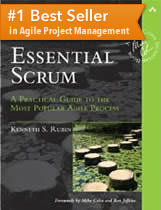Chapter 10: ScrumMaster Role in Scrum
This chapter describes the ScrumMaster role. I begin by describing the purpose of the role relative to the other Scrum roles. Then I define the principal responsibilities and characteristics of a ScrumMaster. Next I illustrate a “day in the life” of the ScrumMaster, which leads to a discussion of whether or not the ScrumMaster role is full-time. I end by describing the kind of person who typically fulfills the ScrumMaster role.
Overview
The ScrumMaster is one of the three roles that constitute every Scrum team. While the product owner is focused on building the right product and the development team is focused on building the product right, the ScrumMaster is focused on helping everyone understand and embrace the Scrum values, principles, and practices. ScrumMasters act as coaches to the development team and to the product owner. They also provide process leadership, helping the Scrum team and the rest of the organization develop their own high-performance, organization-specific approach to Scrum.
A ScrumMaster's Principal Responsibilities
A ScrumMaster acts as a coach, a servant leader, a process authority, an interference shield, an impediment remover, and a change agent.
- Coach. The ScrumMaster observes the behavior of the team and product owner, looking for ways to improve performance.
- Servant Leader. The ScrumMaster is first and foremost a servant to the Scrum team, ensuring that its highest-priority needs are being met so that it can be more effective.
- Process Authority. A ScrumMaster is empowered to ensure that the Scrum team enacts and adheres to the Scrum values, principles, and practices, along with the Scrum team's specific approaches, in order to maximize delivered business value.
- Interference Shield. A ScrumMaster protects the team from outside interference so that it can remain focused on delivering business value every sprint.
- Impediment Remover. The ScrumMaster removes obstacles that inhibit team productivity.
- Change Agent. A good ScrumMaster paves the way for a Scrum team's success by enabling change throughout the organization.
Characteristics/Skills of a ScrumMaster
- Knowledgeable. The best ScrumMasters have a deep understanding of Scrum, a reasonable level of technical expertise, and a working knowledge of the business domain.
- Questioning. Great ScrumMasters ask great questions intended to help uncover insights.
- Patient. Good ScrumMasters give teams time to arrive at appropriate answers on their own.
- Collaborative. To be effective, ScrumMasters must be able to work well with a wide variety of people, from the team to the product owner to key stakeholders to those not directly involved in Scrum at all.
- Protective. A ScrumMaster protects the team within the greater context of making economically sound business decisions.
- Transparent. ScrumMasters communicate transparently, and encourage transparent communication among the team and the rest of the organization.
One other characteristic that is a bit more abstract is something I call agile intuition. You can read all about in my blog post: Agile Intuition: The Colonel Klink Test.”
Fulfilling the ScrumMaster Role
When considering the ScrumMaster role, organizations need to decide who is best suited for it, whether the role is a full-time job, and whether it can be combined with other Scrum and non-Scrum roles.
Who Should Be a ScrumMaster?
Great ScrumMasters can come from many existing non-Scrum roles, including project manager, developer, tester, and so on. As long as the individual has the characteristics mentioned earlier and is willing to take on the responsibilities of the role, anyone can be an effective ScrumMaster. Be cautious about assuming that the existing tech or dev leads should automatically be the ScrumMasters. The fact is, that they are in technical leadership for a reason: they are technically very good at what they do. ScrumMasters need to be technically adept, but they don't need to be experts. In fact, they won't have many occasions to apply technical expertise to the ScrumMaster role.
Is ScrumMaster a Full-Time Job?
Every Scrum team has a ScrumMaster, but is the ScrumMaster a full-time role? Not necessarily. Some high-performing teams need only minimal coaching from a ScrumMaster. In those cases, the ScrumMaster can focus on broader organizational impacts and being a change agent throughout the organization value chain. Being a great ScrumMaster requires a significant commitment of time. In those rare cases where it's not a full-time commitment, some combination of roles may take place.
ScrumMaster Combined with Other Roles
Good ScrumMasters invest time and training in acquiring a valuable, not-so-common set of skills. Although a ScrumMaster can fill in on team work, it sets the ScrumMaster up for potential conflicts of interest and is not the best use of such a specialized skills set. A better way to fill available capacity for a ScrumMaster is to make the person a ScrumMaster for more than one team. Or, have the ScrumMaster use available capacity to mentor the new ScrumMaster of a different team. Don't try to have one person act as a ScrumMaster and a product owner.
Closing
This chapter described the ScrumMaster role, including the desired characteristics and responsibilities of ScrumMasters. Innolution offers specialized training in acquiring these ScrumMaster skills, including Certified ScrumMaster (CSM) courses.
The next chapter will describe the role that the development team plays in Scrum.
